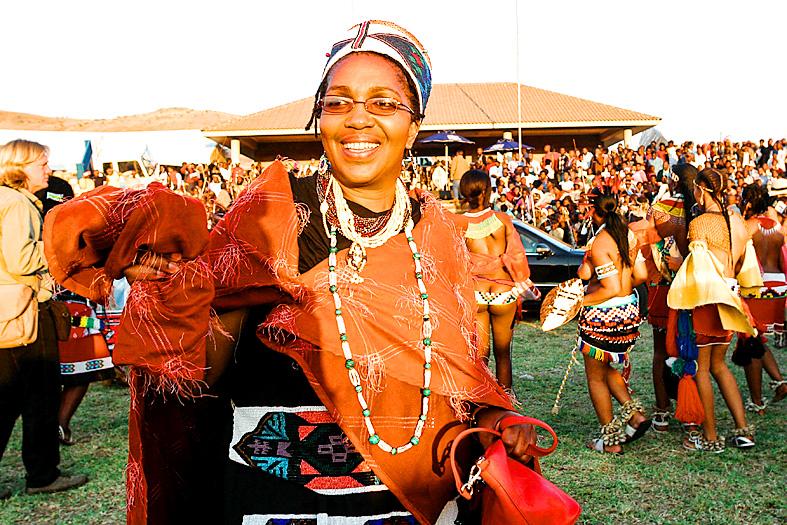The regent of the Zulu nation and wife of South Africa’s recently deceased Zulu King Goodwill Zwelithini died unexpectedly on Thursday, the royal palace announced.
“It is with the deepest shock and distress that the Royal Family announces the unexpected passing of Her Majesty Queen Shiyiwe Mantfombi Dlamini Zulu, Regent of the Zulu Nation,” Mangosuthu Buthelezi, traditional prime minister to the Zulu monarch, said in a statement.
“This has taken us by surprise and left us utterly bereft,” he added without mentioning the cause of death.

Photo: AFP
The sudden death of Dlamini-Zulu, 65, comes days after she was reportedly hospitalized just weeks after her husband’s burial.
Zwelithini passed away on March 12, aged 72, after half a century on the throne, following a battle with diabetes-related illness.
Although the title of Zulu king does not bestow executive power, the charismatic Zwelithini had moral influence over more than 11 million Zulus, nearly a fifth of South Africa’s population.
As the most influential of traditional leaders, he advised legislators and met with powerful politicians throughout his rule.
He left behind six wives, 28 children and a thorny question on succession.
Although she was Zwelithini’s third wife, Dlamini-Zulu held the title of “great queen” — a status determined by her dowry.
Dlamini-Zulu was the sister of King Mswati III of Eswatini. She was elected regent while the royal family was in a three-month mourning period before the next monarch was named.
Some speculated that her eldest son, Prince Misuzulu Zulu, 46 — whose name can be loosely translated as “strengthening the Zulus” — could be heir to the throne.
Buthelezi on Thursday said that while the royal household was grief-stricken, “there will be no leadership vacuum in the Zulu nation.”

In the sweltering streets of Jakarta, buskers carry towering, hollow puppets and pass around a bucket for donations. Now, they fear becoming outlaws. City authorities said they would crack down on use of the sacred ondel-ondel puppets, which can stand as tall as a truck, and they are drafting legislation to remove what they view as a street nuisance. Performances featuring the puppets — originally used by Jakarta’s Betawi people to ward off evil spirits — would be allowed only at set events. The ban could leave many ondel-ondel buskers in Jakarta jobless. “I am confused and anxious. I fear getting raided or even

Kemal Ozdemir looked up at the bare peaks of Mount Cilo in Turkey’s Kurdish majority southeast. “There were glaciers 10 years ago,” he recalled under a cloudless sky. A mountain guide for 15 years, Ozdemir then turned toward the torrent carrying dozens of blocks of ice below a slope covered with grass and rocks — a sign of glacier loss being exacerbated by global warming. “You can see that there are quite a few pieces of glacier in the water right now ... the reason why the waterfalls flow lushly actually shows us how fast the ice is melting,” he said.

Eleven people, including a former minister, were arrested in Serbia on Friday over a train station disaster in which 16 people died. The concrete canopy of the newly renovated station in the northern city of Novi Sad collapsed on Nov. 1, 2024 in a disaster widely blamed on corruption and poor oversight. It sparked a wave of student-led protests and led to the resignation of then-Serbian prime minister Milos Vucevic and the fall of his government. The public prosecutor’s office in Novi Sad opened an investigation into the accident and deaths. In February, the public prosecutor’s office for organized crime opened another probe into

RISING RACISM: A Japanese group called on China to assure safety in the country, while the Chinese embassy in Tokyo urged action against a ‘surge in xenophobia’ A Japanese woman living in China was attacked and injured by a man in a subway station in Suzhou, China, Japanese media said, hours after two Chinese men were seriously injured in violence in Tokyo. The attacks on Thursday raised concern about xenophobic sentiment in China and Japan that have been blamed for assaults in both countries. It was the third attack involving Japanese living in China since last year. In the two previous cases in China, Chinese authorities have insisted they were isolated incidents. Japanese broadcaster NHK did not identify the woman injured in Suzhou by name, but, citing the Japanese